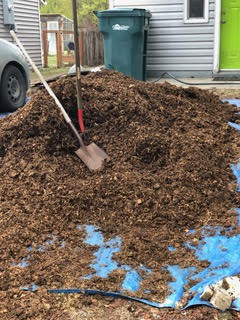Composting is a rewarding way to transform kitchen and yard waste into nutrient-rich soil. Here are some answers to common questions we get after holding on of our composting workshops to help you on your composting journey!
Turning Your Compost Pile: When and Why?
Regularly turning your compost pile is crucial for aeration, which helps the decomposition process by providing oxygen to the microbes doing all the hard work.
- Timing is Key: There’s no strict schedule, but a good rule of thumb is to turn your pile every 3-7 days when it’s actively decomposing and hot. If the pile is new or not heating up, you can turn it less frequently. You’ll notice the temperature drop after turning, but it should quickly rebound if your mix of “greens” (nitrogen-rich) and “browns” (carbon-rich) is balanced and there’s enough moisture.
- Why Turn? Turning helps distribute moisture and microbes, breaks up clumps, and prevents anaerobic (without oxygen) conditions that can lead to foul odors.
Making a Sifter/Sieve: An Easy Win for Great Soil!
It’s fantastic that you’ve already experienced the benefit of a sifter or sieve for sifting soil! For those looking to make one, it’s a simple DIY project that greatly improves the quality of your finished compost.
- Why You Need One: A sifter/sieve helps separate finished, fine compost from larger, un-decomposed material, which can then be returned to the compost pile.
- Simple Construction: You can easily make a sifter/sieve using a sturdy wooden frame and hardware cloth (wire mesh) with 1/2-inch openings. Just staple or screw the hardware cloth to the bottom of the frame. You can even repurpose a wire wastebasket or an old picture frame!
Managing Your Compost Pile: Temperature, Pests, and Winter Woes
- Temperature Control: A healthy, active compost pile will generate heat (reaching 120-160°F or 49-71°C) as microbes break down organic matter. This heat helps kill weed seeds and pathogens. If your pile isn’t heating up, it likely needs more “greens” (like spent grain, coffee grounds, grass clippings or food scraps) for nitrogen, more moisture (it should feel like a damp sponge), or more turning for aeration.
- Keeping Pests Away (Mice & Dogs):
- Mice: To deter mice, ensure your “greens” (especially food scraps) are buried deep within the pile, covered by “browns.” Avoid adding meat, dairy, or oily foods, which are particularly attractive to rodents. A well-constructed, enclosed compost bin can also be very effective.
- Dogs: The best way to protect your pile from dogs is to enclose it. This could be a sturdy bin with a lid, a fenced-off area, or even a simple wire mesh cage. Dogs are often attracted to food scraps, so burying them deeply also helps.
- Winter Snow Load: In areas with heavy snow, consider the structural integrity of your compost bin. If it’s an open pile, a heavy snow load can compact it, slowing decomposition. Turning before winter sets in and ensuring your bin is robust enough to handle the weight will help. Decomposition slows significantly in freezing temperatures, but your pile will likely start back up once spring arrives.
Transporting Materials to Your Compost Pile: Making it Easy
- Strategize Location: If possible, locate your compost pile conveniently close to your kitchen for food scraps and near your garden for yard waste. Except at early phases, it doesn’t need to be observed every day.
- Kitchen Caddy: A small, lidded container in your kitchen makes it easy to collect food scraps throughout the day before emptying them into your main compost pile.
- During the winter, we recommend a container on the kitchen counter that can be emptied into a lidded five-gallon bucket outside your back door. When the bucket fills up, let it thaw inside and then dump it into the compost pile.
Getting Started with Vermicomposting (Worm Composting)
Welcome to the wonderful world of vermicomposting! It’s a fantastic way to compost food scraps indoors.
- Worms are Your Workers: Red wiggler worms (Eisenia fetida) are the stars of vermicomposting. They eat your food scraps and excrete nutrient-rich “worm castings,” a superfood for plants.
- Essential Materials:
- Coco Coir: It’s an excellent bedding material for your worms, providing a moist, airy, and stable environment. Leaf mulch from your yard, shredded newspaper or shredded cardboard also work well. You can purchase a block of coir for about $5 at Alaska Mill and Feed.
- Crushed Shells (Grit): Worms don’t have teeth, so they need grit (like crushed eggshells) to help them grind down food in their gizzard. This is an important addition for healthy worms! If you don’t have eggshells to use, oyster shell is available in the poultry sections local feed stores.
Worm Appetite: How Much Will They Eat?
- Start Small: When you first get your worms, they’ll be adjusting. Start by feeding them small amounts of food scraps, about 1-2 cups every few days for a pound of worms.
- Gradual Increase: As they settle in and reproduce, their appetite will increase. A general guideline is that a healthy worm bin can process about half its weight in food scraps per day. So, one pound of worms can eat about half a pound of food scraps daily.
- Observe and Adjust: The best way to know how much your worms will eat is to observe! If food is disappearing quickly, you can add more. If it’s lingering, reduce the amount. Overfeeding can lead to odors and attract pests.

